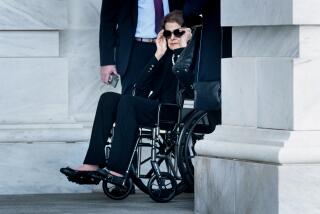Senate Debates Permanent Demise of ‘Death Tax’
WASHINGTON — When Congress passed a $1.35-trillion tax cut last year, it created a major incentive for the wealthiest taxpayers to die before New Year’s Day 2011.
Under the law, the federal estate tax is scheduled to be reduced gradually over the next eight years and repealed entirely in 2010. But when the calendar turns to Jan. 1, 2011, the law calls for the full, sudden resurrection of what critics call the “death tax.”
The Senate on Tuesday, facing pressure to address that issue, agreed to take up by late June legislation to abolish the estate tax indefinitely.
Senate Majority Leader Tom Daschle (D-S.D.), who last week vowed to block any action on House-passed legislation to make the entire 10-year tax cut permanent, asserted Tuesday that he has enough votes to thwart the Republican-led effort to extend the provision to repeal the estate tax.
An accord Daschle reached with Republicans committed the Senate to a brief debate on the estate tax by June 28, with 60 votes required for passage of a GOP or Democratic proposal. That is a tall order in a 100-member Senate that is almost evenly split between the two parties.
The debate on the estate tax, however, could pose political difficulties for several Senate Democrats in an election year with control of the chamber at stake.
“This is a red-meat tax vote for Republicans,” said Stephen Moore, president of the Club for Growth, an anti-tax political action committee. “Just getting a vote I take as a victory for the tax cut agenda. It puts the Democrats on record once again.”
Only a tiny fraction of estates--about 45,000, as of 1999--are actually taxed by the federal government. But many more taxpayers consult tax attorneys and financial advisors in an effort to avoid taxes.
As of this year, estates valued at $1 million or less are exempt from the federal tax. Estates worth more face tax rates as high as 50%.
The tax law enacted last year, championed by President Bush, gradually raises the exemption and lowers the tax rate. But for political and procedural reasons, the law, which also cuts income tax rates and provides other tax breaks, expires Dec. 31, 2010.
As a result, the 2001 top estate tax rate of 55% would go back into effect for anyone who dies the next day.
Bush and congressional Republicans recently resumed the tax cut cause, gearing up their push to make the entire law permanent. Democratic leaders are seeking to block them, arguing that the tax cuts already in effect were partly responsible for throwing the federal budget into deficit.
Maintaining party discipline on the estate tax issue will be a challenge for Daschle.
Sen. Ben Nelson of Nebraska, one of 12 Senate Democrats who voted for the overall tax cut measure, said he would favor wiping out the estate tax altogether. Nelson said that the issue is urgent because the law as it stands prevents rational estate planning.
Taxpayers, Nelson said, “don’t want to have to figure out whether to die in the next 10 years.”
GOP leaders count at least 58 votes in favor of extending the repeal.
On Feb. 13, the Senate voted, 56 to 42, in favor of a nonbinding resolution sponsored by Sen. Jon Kyl (R-Ariz.) to eliminate the tax altogether. The supporters of the Kyl resolution included several vulnerable Democrats up for reelection: Sens. Max Baucus of Montana, Max Cleland of Georgia, Tim Johnson of South Dakota and Mary Landrieu of Louisiana. In addition, two senators who did not vote on the matter in February--Robert F. Bennett (R-Utah) and Pete V. Domenici (R-N.M.)--have supported estate tax repeal in the past.
And some opponents of the Kyl resolution have either supported repeal previously--such as Sens. Patty Murray (D-Wash.), John B. Breaux (D-La.) and John McCain (R-Ariz.)--or face tough election battles this year. One who could face heavy lobbying to change her vote is Sen. Jean Carnahan (D-Mo.).
Across the Capitol, support for a permanent repeal of the estate tax is strong. Last year, the House approved legislation to repeal the estate tax entirely on a broad bipartisan vote of 274 to 154. Fifty-eight Democrats and one independent joined 215 Republicans in support of the measure.
More to Read
Sign up for Essential California
The most important California stories and recommendations in your inbox every morning.
You may occasionally receive promotional content from the Los Angeles Times.










